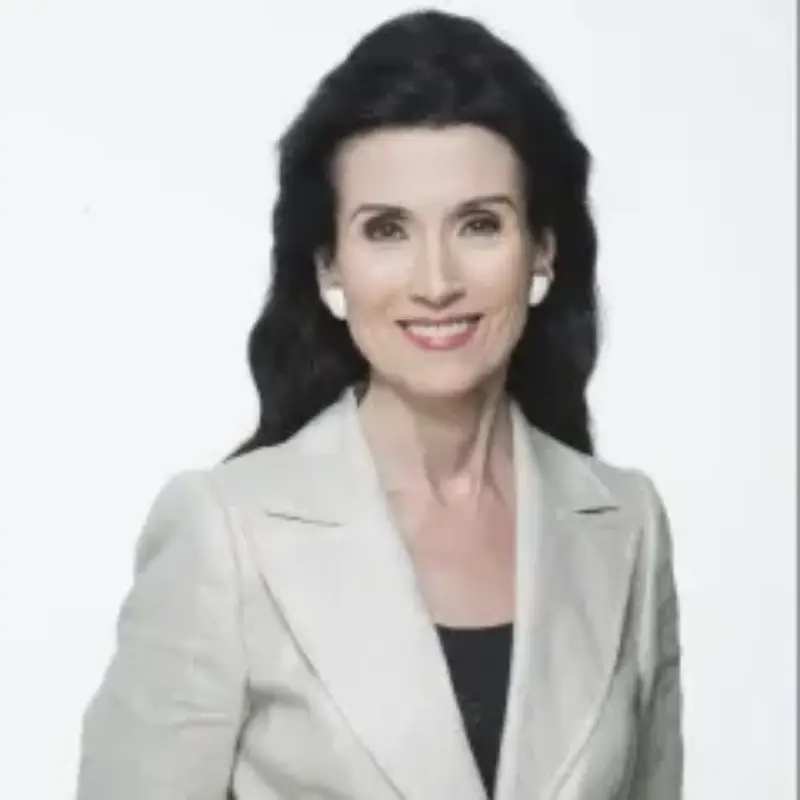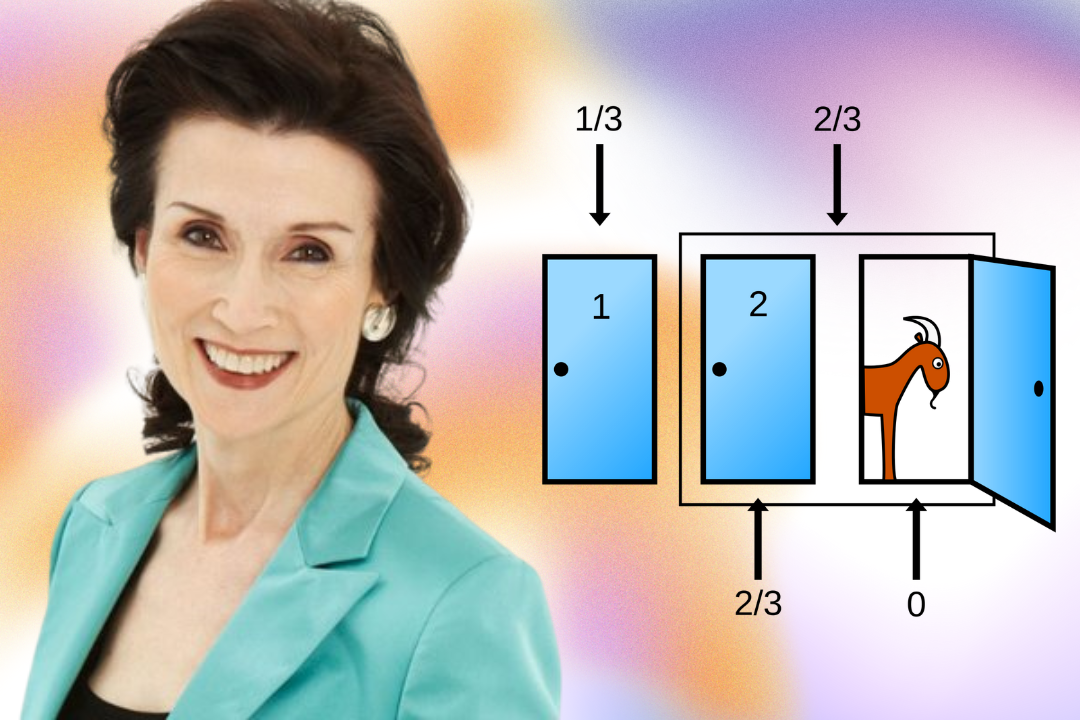In a world where intelligence often equates to acclaim, one woman’s extraordinary IQ score—higher than those of Einstein, Stephen Hawking, and Elon Musk—should have made her a universal icon. Yet, despite setting a record that still stands unmatched, her correct answer to a seemingly straightforward question sparked an avalanche of ridicule that overshadowed her brilliance. This is the woman with the highest recorded IQ who, in spite of the fact, found herself at the center of a controversy that questioned more than just her intelligence. What was the question, and why did it provoke such outrage?
The Infamous Monty Hall Problem

The Monty Hall Problem is one of the most fascinating riddles in the history of brainteasers. This mathematical puzzle, which takes its name from the host of the well-known game show “Let’s Make A Deal,” captures a situation that seems straightforward at first glance but is full of unexpected options.
Here’s the essence of the problem, as sent by a reader to the “Ask Marilyn” column in Parade in 1991:
“Suppose you’re on a game show, and you’re given the choice of three doors: Behind one door is a car; behind the others, goats. You pick a door, say No. 1, and the host, who knows what’s behind the other doors, opens another door, say No. 3, which has a goat. He then asks you, ‘Do you want to switch to door No. 2?’ Is it to your advantage to switch your choice?”
The roots of the problem trace back to its namesake, Monty Hall, and the game show dynamics where contestants faced similar choices, albeit without explicit reference to the underlying probabilities. The puzzle taps into fundamental aspects of probability and human psychology, where the correct choice defies our intuitive expectations.
The puzzle’s ongoing appeal stems from its defiance of common sense; although mathematical analysis shows that switching doors really doubles the likelihood of winning the car, intuition indicates that there is no benefit to doing so. Because of its illogical solution, the Monty Hall Problem is frequently discussed and examined in both scholarly and popular contexts.
A Woman’s Answer That Sparked a Firestorm of Ridicule
Marilyn Vos Savant, the woman behind the popular “Ask Marilyn” column, inadvertently ignited a firestorm with her straightforward response to the Monty Hall problem. When posed with the dilemma of whether to switch doors on a game show, she replied confidently: “Yes, you should switch. The first door has a 1/3 chance of winning the car, but the second has a 2/3 chance of winning the car.” This advice, however, did not sit well with a broad swath of her audience.
The backlash was quick and severe. Vos Savant’s column typically addressed a wide array of questions with crisp, clear logic, but this particular answer drew unprecedented ire. Over 10,000 letters poured in, many from incensed readers who vehemently disagreed with her logic. The criticism ranged from pedantic corrections to outright insults.
One particularly harsh letter stated, “You blew it, and you blew it big! Since you seem to have difficulty grasping the basic principle at work here, I’ll explain.”
Moreover, the controversy wasn’t limited to lay readers. A The New York Times article noted that among the disparaging responses, “close to 1,000 carried signatures with Ph.D.’s, and many were on letterheads of mathematics and science departments.”
“Your logic is in error, and I am sure you will receive many letters on this topic from high school and college students. Perhaps you should keep a few addresses for help with future columns,” read one letter from Georgia State University.
Another letter from Georgetown University said, “If you can admit your error you will have contributed constructively toward the solution of a deplorable situation. How many irate mathematicians are needed to get you to change your mind?”
A PhD doctor from the University of Michigan even invoked the Father of Modern Physics, saying, “Albert Einstein earned a dearer place in the hearts of people after he admitted his errors.”
This academic uproar reflected not just a misunderstanding of the problem’s underlying statistics but also deeper biases.
One letter even suggested a gendered difference in mathematical reasoning: “Maybe women look at math problems differently than men.” Another simply insulted her, proclaiming, “You are the goat!”
She Was Right All Along
The response Marilyn Vos Savant gave to the Monty Hall problem caused an uproar that necessitated not just one, but three follow-up columns to clarify her reasoning.
When initially presented with three doors, the chances of choosing the car were 1 in 3. After the host, who knows what’s behind each door, opens one to reveal a goat, the likelihood doesn’t split evenly between the remaining two doors as intuition might suggest. Instead, Vos Savant explained, “The winning odds of 1/3 on the first choice can’t go up to 1/2 just because the host opens a losing door.” Mapping out various scenarios reveals that switching doors indeed offers a two-thirds (66.6%) chance of winning, while sticking with the original choice gives only a one-third (33.3%) chance.
This counterintuitive outcome is better understood through a more exaggerated illustration. Imagine the game show presented you with 100 doors. You pick door #1, giving you a 1/100 chance of finding the car. The host then opens 98 other doors, all hiding goats, leaving just door #1 and another, say door #100. Although it might seem your odds have improved with fewer doors, the probability that the car is behind door #100 is now 99/100, significantly higher than the slim 1/100 chance that it remains behind your initial pick.
Monty Hall himself commented on the psychological aspects of the game, which further complicate player decisions. He noted that the more he offered contestants cash not to switch, the more convinced they became that their initial choice was correct—a psychological anchoring effect that clouded their judgment.
This cognitive dissonance—where new information (like the improved odds of switching doors) conflicts with existing beliefs (that each remaining door has equal probability)—explains much of the resistance to Vos Savant’s correct explanation. People tend to cling to their initial beliefs, even in the face of contradictory evidence, leading to widespread public and academic error.
Ultimately, computer simulations and classroom demonstrations across the country validated Vos Savant’s logic. Over time, the tide of opinion shifted dramatically: by the end of 1992, support among readers rose from 8% to 56%, and among academics from 35% to 71%.
Robert Sachs, a math professor who initially criticized Vos Savant, epitomized the changing attitudes when he later wrote to her, acknowledging his mistake: “After removing my foot from my mouth I’m now eating humble pie,” he admitted, vowing to personally respond to those he had led astray. “I vowed as penance to answer all the people who wrote to castigate me. It’s been an intense professional embarrassment.”
Getting to Know Marilyn Vos Savant

Marilyn Vos Savant, who gained widespread recognition not only for her prolific “Ask Marilyn” column but also for recording the highest IQ according to the Guinness Book of World Records, has been a subject of fascination and respect. Her IQ, reportedly higher than historical geniuses like Albert Einstein, Stephen Hawking, and contemporaries such as Elon Musk, places her in a unique position within the public and academic spheres.
Born in 1946 in St. Louis, Missouri, Vos Savant made headlines in the mid-1980s when her intellectual achievements were first publicized. Her exceptional cognitive abilities became the cornerstone for her weekly column in Parade magazine, where she solved complex mathematical problems and answered queries from readers about various subjects, demonstrating her broad range of knowledge and analytical prowess.
The Monty Hall problem brought her an unusual kind of celebrity, primarily due to the overwhelming flood of criticism following her counterintuitive but correct solution. Despite being correct, her response drew sharp rebukes from both the public and professionals in the fields of mathematics and science. The criticism was often harsh and personal, challenging her intellectual capacity and integrity. Yet, Vos Savant handled the situation with remarkable grace and patience.
In addressing the criticism, Vos Savant maintained a composed and educative tone, using the opportunity to further elucidate her reasoning in subsequent columns. Her responses were clear, methodical, and maintained a focus on educating her detractors, rather than defending her ego. She illustrated the principles of probability with simple, understandable examples, and invited readers to test the scenario themselves, promoting a deeper understanding of the problem.
Vos Savant’s demeanor during this period exemplified her grace in rational discourse and education. Rather than retreating or responding in kind to often vitriolic attacks, she continued to engage with her audience, patiently explaining and expanding on her reasoning and standing firm on her analysis. Her approach not only underscored her intellectual integrity but also highlighted her role as a public educator.
Beyond the Monty Hall controversy, Marilyn vos Savant has authored several books, imparting her wisdom on topics ranging from general intelligence to personal philosophy. Her work continues to inspire those who value intellect and reason, and her life remains a testament to the virtues of intelligence, patience, and resilience in the face of public scrutiny.
Inspiration From a Woman’s Triumph
Marilyn vos Savant’s encounter with the Monty Hall problem not only showed a fascinating statistical puzzle but also spotlighted deeper societal issues, such as the persistence of sexism and misogyny, even within educated and intellectual communities. The backlash she faced, steeped in gender bias, as evident from dismissive comments about “female logic” and overly personal critiques, underscored a troubling reality: intellectual arenas are not immune to the biases that pervade society at large.
Despite the storm of criticism, vos Savant navigated the controversy with remarkable grace and steadfastness, focusing on educating rather than retaliating. Her method of dealing with criticism—utilizing clarity to explain her reasoning and encouraging skeptics to test the problem themselves—transformed a contentious debate into a valuable teachable moment. This approach not only demonstrated the power of education in overcoming misinformation but also reinforced the importance of standing by one’s understanding and knowledge, even when faced with overwhelming opposition.
This goes to show that her story is a compelling chapter in the broader narrative of women in science and academia, offering inspiration and important lessons on resilience, clarity, and integrity in the pursuit of truth.
Featured image via @VirtualMvS on X


